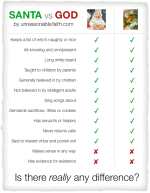To summarize my point: claims of the existence of beings like gods, elves, fairies, etc., are empirical claims. You can't prove logically that they don't exist, but you can prove it empirically. That means that there will always be a logical argument somewhere that they could exist, just not a plausible one. And it is on that basis, I think, that we can "disprove" the existence of gods in an empirical sense. We can assess the plausibility of such claims.
I think THIS is where skeptics are exposing values that aren't shared with the biblicists. God's defined well enough. All the nitpicking over "which God?" and how farting space goats or Santa Claus don't compare to the Christian God isn't an ill-defined God, but just biblicists asserting "you're making shit up but I'm not".
This gets to my thoughts on why skeptics and biblicists talk past one another, and cannot do otherwise. To me this is all a discussion of myths -- and not in the sense of falsehoods but the stories people make to relate their self to the cosmos. Christian theists know skeptics see their "biblicism" as simple stories and consider us ludicrous for that. They're "inside" the myth looking out. It isn't a philosophical system constructed by the use of human reason; for them it's a revealed image of how things are and, as such, answerable to nothing but itself.
When a biblicist is presented with farting space goats or invisible dragons, to him that's someone "making things up". So it doesn't compare at all to his biblicism, which isn't made up.
They'll protest it's reasoned, that there are valid apologetics. And complain atheists keep demanding non-biblical reasons. As here:
...
I'll happily argue for Christian particularism ...
But the stock standard repertoire of counter-apologetics is;
*Miracles are impossible
*The universe wasn't created
*Religion was invented
*"Thats not evidence"
*Argument from incredulity
*Utilitarian benefits of atheism
...and none of these demand an apologetic specific to the bible, let alone Christianity or orthodoxy.
Skeptics are in effect asking the biblicist to step outside the fishbowl of their "particularism" and look at it from an outsider perspective. But, a biblicist can't analyze the whole edifice of their myth because, again, for them it's not an edifice. It's the cosmos. It doesn't trace back to the human imagination like a fairy tale. The reasoning of his "reasoned faith", his apologetics, is entirely a matter of filling out the details
within the myth. And that's all. A biblicist cannot reason his faith except to tell why the beings and events within the myth happen as they do. Hell exists because God wants you to have free will. God exists because the world's made and he's the world-maker. ALL their reasoning is limited to
inside the myth (their cosmos). If a skeptic can't speak in these terms, then... to a biblicist... that's the skeptic being obtuse.
It's much like talking to a legalistic bureaucrat about his bureaucracy. You'll get "policy says" repeated to you forever. The justification of the system itself is the rules-maker that made it.
It's also something like talking with an isolated tribe. The skeptic is trying to tell the tribe-members their understanding of the cosmos is a myth. But to them it's handed down from the ancestors as well as communicated directly through special experiences of the sacred. The skeptic's eggheaded valuation of scientific evidence (the water of the fishbowl that skeptics live inside of) is supposed to trump everything that makes his life meaningful?
I suggest probably there's no meeting of the minds possible here. Defining terms won't created a common ground. If the atheist tries defining terms, then get the slightest detail differently from the biblicist's understanding, or if it's not as wholly positive as he wants (both of which are inevitable), it'll be called a straw man misrepresentation; or you're criticizing "someone else's God, not mine".
For a biblicist to be induced out of his "fishbowl", the believer has to feel its limits constricting him. So long as he's feeling safe in his haven, then atheists are only just nuts for suggesting he's got anything wrong.

 You should work on clearing up what you think before you attempt to devine what I think. If you want to know just ask. I'll tell you.
You should work on clearing up what you think before you attempt to devine what I think. If you want to know just ask. I'll tell you.